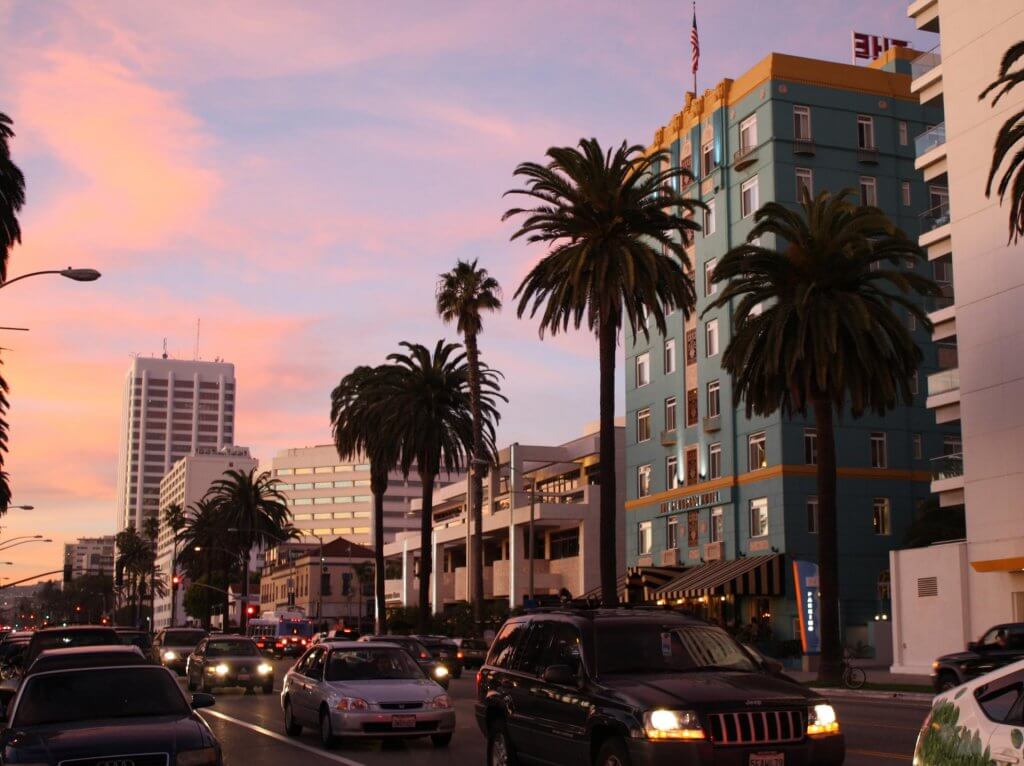City of Santa Monica


Santa Monica is a beachside city of 8.3 square miles on the westside of Los Angeles County. Offering an environment of unparalleled natural beauty, the city is home to a mix of residential communities, commercial districts, and recreational venues. Recently named by National Geographic as one of the Top "10 Beach Cities in the World" and by TIME as one of the "Best Places to Live", Santa Monica features three miles of Pacific beaches and the Santa Monica Pier. Santa Monica’s residential population is approximately 93,000, increasing to an estimated 250,000 during the day with tourists, shoppers, and employees. Tourism attracts over 8 million visitors annually.
The City of Santa Monica was incorporated on November 30, 1886 and subsequently adopted a City Charter in 1945. In 1947, a City Council-City Manager form of government was established. The City Council consists of seven members elected by the community at large to four year terms.
The City of Santa Monica is a full-service city. City departments provide police, fire, a regional transportation network, water, refuse and recycling, streets, parking, planning, building, engineering, free public wifi, a high speed fiber optic network, parks, affordable housing, economic development, library, rent control, recreational, cultural, and educational services to the community.
The City-operated Big Blue Bus regional bus service provides over 16.5 million rides for customers each year, all powered by renewable natural gas. Breeze Bike Share was Southern California's first bike share system with 500 bikes at 85 locations. In 2016, the Metro Expo Line opened connecting Santa Monica to Downtown Los Angeles in under an hour.
The City of Santa Monica is a national leader in environmental, economic and social sustainability. The City is working toward aggressive climate action goals including: water self-sufficiency by 2020, zero waste by 2030, and carbon neutrality by 2050.
The highly-rated Santa Monica-Malibu Unified School District serves both Santa Monica and Malibu residents. Santa Monica College (SMC), one of the state's top two-year community colleges, serves over 30,000 full-time and part-time students on several campuses and offers more than 90 fields of study. Santa Monica's strong education institutions are complemented by the 5-star rated Santa Monica Public Library system.
Public safety is a top priority in the City of Santa Monica. Santa Monica Fire Department continues to maintain a Class 1 ISO rating, the highest possible rating.
Santa Monica has a strong and diverse economy. Known as “Silicon Beach,” local businesses are at the leading edge of the nation’s creative economy and startup scene.
Sana Monica is also home to three renowned and respected health facilities, Providence Saint John’s Health Center, Santa Monica-UCLA Medical Center and Kaiser Permanente.
Connect with the City of Santa Monica by visiting www.santamonica.gov, follow @santamonicacity on Twitter, or sign up for the City's newsletter and emergency alerts at www.smgov.net/newsletter.

Santa Monica is a beachside city of 8.3 square miles on the westside of Los Angeles County. Offering an environment of unparalleled natural beauty, the city is home to a mix of residential communities, commercial districts, and recreational venues. Recently named by National Geographic as one of the Top "10 Beach Cities in the World" and by TIME as one of the "Best Places to Live", Santa Monica features three miles of Pacific beaches and the Santa Monica Pier. Santa Monica’s residential population is approximately 93,000, increasing to an estimated 250,000 during the day with tourists, shoppers, and employees. Tourism attracts over 8 million visitors annually.
The City of Santa Monica was incorporated on November 30, 1886 and subsequently adopted a City Charter in 1945. In 1947, a City Council-City Manager form of government was established. The City Council consists of seven members elected by the community at large to four year terms.
The City of Santa Monica is a full-service city. City departments provide police, fire, a regional transportation network, water, refuse and recycling, streets, parking, planning, building, engineering, free public wifi, a high speed fiber optic network, parks, affordable housing, economic development, library, rent control, recreational, cultural, and educational services to the community.
The City-operated Big Blue Bus regional bus service provides over 16.5 million rides for customers each year, all powered by renewable natural gas. Breeze Bike Share was Southern California's first bike share system with 500 bikes at 85 locations. In 2016, the Metro Expo Line opened connecting Santa Monica to Downtown Los Angeles in under an hour.
The City of Santa Monica is a national leader in environmental, economic and social sustainability. The City is working toward aggressive climate action goals including: water self-sufficiency by 2020, zero waste by 2030, and carbon neutrality by 2050.
The highly-rated Santa Monica-Malibu Unified School District serves both Santa Monica and Malibu residents. Santa Monica College (SMC), one of the state's top two-year community colleges, serves over 30,000 full-time and part-time students on several campuses and offers more than 90 fields of study. Santa Monica's strong education institutions are complemented by the 5-star rated Santa Monica Public Library system.
Public safety is a top priority in the City of Santa Monica. Santa Monica Fire Department continues to maintain a Class 1 ISO rating, the highest possible rating.
Santa Monica has a strong and diverse economy. Known as “Silicon Beach,” local businesses are at the leading edge of the nation’s creative economy and startup scene.
Sana Monica is also home to three renowned and respected health facilities, Providence Saint John’s Health Center, Santa Monica-UCLA Medical Center and Kaiser Permanente.
Connect with the City of Santa Monica by visiting www.santamonica.gov, follow @santamonicacity on Twitter, or sign up for the City's newsletter and emergency alerts at www.smgov.net/newsletter.

Santa Monica is a beautiful beachfront city that is located in the southern portion of California. The city has been a popular tourist destination since the early 20th century. A downtown revitalization project in the 1980s combined with an explosion in job growth in recent years has caused this sensational city to boom.
Read more